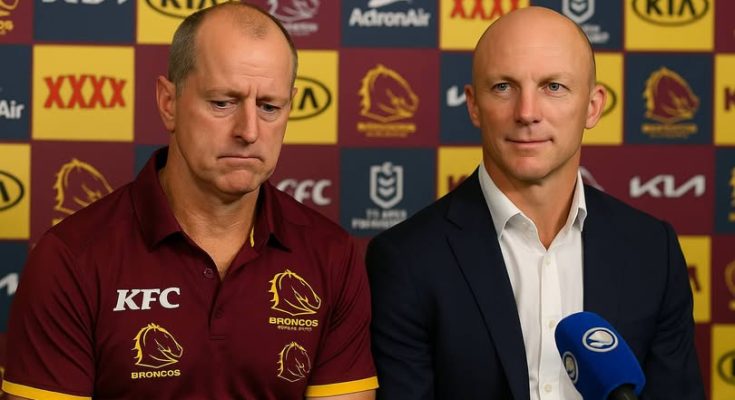In a shocking development that has sent ripples throughout the National Rugby League, the Brisbane Broncos have officially sacked head coach Michael Maguire and appointed club legend Darren Lockyer as the interim head coach for the remainder of the 2025 NRL season. The news broke early Tuesday morning, just days after the Broncos suffered a crushing loss at home, and sources within the organization confirm that tensions had been building behind the scenes for weeks. Maguire’s departure marks a dramatic turn in what had already been a turbulent campaign for the powerhouse club, and the decision to install Lockyer—a former captain, premiership winner, and iconic figure in Brisbane’s storied history—signals a bold and symbolic move by the organization.
Maguire, who only took over the reins in 2023, came to Brisbane with a reputation as a no-nonsense operator known for his discipline, intensity, and previous success with the South Sydney Rabbitohs and the New Zealand national team. However, his tenure at the Broncos has been plagued by inconsistency, internal conflict, and an inability to get the best out of a roster stacked with talent but lacking cohesion. The Broncos were expected to contend for the premiership this year, boasting a squad that includes dynamic stars like Reece Walsh, Payne Haas, Patrick Carrigan, and Kotoni Staggs. Instead, they sit outside the top eight with a losing record, prompting serious questions about the team’s direction under Maguire’s stewardship.
Club chairman Karl Morris released a brief but pointed statement following the announcement, thanking Maguire for his services but stating that the club had “no choice but to act in the best interests of the Brisbane Broncos moving forward.” Morris cited the need for “urgent cultural recalibration” and “a return to the values that have historically defined this club.” Sources indicate that player unrest, questionable tactical decisions, and a breakdown in communication with key members of the playing group ultimately sealed Maguire’s fate. Some senior players reportedly approached management privately to express their concerns, and while no one player is being blamed, the cumulative effect of the locker room tension made Maguire’s position untenable.
Enter Darren Lockyer—a name that resonates with every Broncos fan and commands instant respect within rugby league circles. Lockyer’s appointment as interim coach is as much a morale play as it is a strategic one. The former fullback-turned-five-eighth played 355 games for Brisbane between 1995 and 2011, winning four premierships and captaining both the Queensland Maroons and Australian Kangaroos during a glittering career. Since retirement, Lockyer has held various off-field roles, including as a member of the Broncos’ board and as a selector for Queensland. He has long been considered a future head coach in some capacity, and this interim appointment, while unexpected, may be the first step toward a permanent leadership role.
Lockyer addressed the media in a calm and focused manner shortly after the announcement was made official. “This is not how anyone envisioned things playing out, but my commitment is to steady the ship and give our boys a clear path forward,” he said. “I know what this club stands for. I’ve lived it. And I’m confident that we can bring back that identity that made us such a formidable force.” Lockyer emphasized his intent to reconnect with the players on both a tactical and emotional level, saying his priority was “making the jersey mean something again.” While he acknowledged the pressure and intensity of the role, he projected a sense of calm authority that many in the rugby league world have long associated with his playing days.
Initial reactions from current players suggest a mix of surprise, respect, and cautious optimism. Reece Walsh, the team’s electric fullback, spoke briefly about the change after training. “It’s been a crazy day. Madge \[Maguire] had a lot of belief in us, and we respect what he tried to do. But having someone like Locky step in—it’s surreal. That’s someone you grew up watching and idolizing.” Co-captain Patrick Carrigan echoed the sentiment, adding, “We need to own our performances, and we know we haven’t been good enough. Hopefully this is the jolt we need.” Players and staff were reportedly notified early in the morning before a team meeting was held to clarify the situation. Maguire said goodbye to the squad in what was described as an emotional farewell, thanking them for their effort and urging them to stay united.
The fallout from Maguire’s dismissal is sure to be far-reaching. From an organizational standpoint, the Broncos are now facing the dual challenge of steadying a free-falling campaign while simultaneously beginning the process of identifying a long-term head coach. Lockyer’s appointment may ultimately transition into something more permanent, depending on how the team responds over the coming weeks. Club insiders believe that results over the next month—including crucial clashes against the Melbourne Storm and Penrith Panthers—will determine whether Lockyer’s trial run extends into the 2026 season.
While some critics will argue that the club has once again succumbed to reactive decision-making—recalling past instability such as the abrupt exit of Anthony Seibold—others will point to the symbolic strength of turning back to a legend like Lockyer in a time of crisis. The hope is that his deep understanding of the Broncos’ identity, coupled with his unmatched legacy and calm demeanor, can galvanize a squad that has looked mentally fragile and tactically confused under pressure. For all of Maguire’s tactical nous, his demanding approach and reported difficulty adapting to the modern player-coach dynamic may have finally caught up with him in a way that could see his NRL coaching prospects pause for the foreseeable future.
Maguire’s departure also raises broader questions about recruitment, player development, and board-level decision-making within the Broncos’ structure. The team has made high-profile signings in recent years, but cohesion has often lagged behind on-field talent. Critics have pointed to a revolving door of coaches—Wayne Bennett, Seibold, Kevin Walters, and now Maguire—arguing that leadership instability has been a key contributor to the club’s failure to return to premiership contention. Others suggest the Broncos need to invest more deeply in systems rather than personalities, citing the example of long-term successful programs like the Melbourne Storm or Penrith Panthers.
Despite all the drama, Brisbane remains one of the most resource-rich clubs in the NRL, with elite facilities, a massive fan base, and the pulling power to attract top-tier talent. What they have lacked in recent years is continuity, trust, and a clear footballing identity—traits Lockyer is hoping to instill quickly, even if his time in charge is only temporary. The former great is expected to retain most of the current support staff, though minor changes in player management and training schedule have already begun. Sources close to the team suggest Lockyer will bring a more player-empowering style, grounded in mutual accountability and open communication.
Behind the scenes, the front office is already compiling a list of potential full-time candidates should Lockyer opt not to pursue the role long term. Names like Jason Ryles, Shane Flanagan, and even a potential return of Wayne Bennett have surfaced in speculative conversations. However, with Lockyer now holding the reins, the next few weeks will serve as a crucial audition—not only for the coach himself but also for a roster that must finally begin to live up to its promise. Every game now carries added weight. Not just in the standings, but in proving that the Broncos are serious about reclaiming their status as one of rugby league’s premier clubs.
As the club moves forward, one can’t ignore the underlying emotional resonance of Lockyer stepping back into the center of the arena. For many fans, it feels like a full-circle moment. A return not just to a familiar face, but to the values of leadership, loyalty, and excellence that defined the Broncos’ golden era. Whether that symbolism can translate into tangible results remains to be seen, but if nothing else, the club has made a statement: enough is enough, and a new chapter begins now.
The NRL community will be watching closely. Lockyer’s first match in charge is set for this weekend against a desperate Wests Tigers side, and it will be the clearest indication yet of whether Brisbane’s gamble can produce immediate dividends. The stadium will be packed, the cameras rolling, and the pressure intense. But for Darren Lockyer, pressure is nothing new. He faced it as a 17-year-old debutant, as a premiership-winning captain, and as a leader of men during Queensland’s Origin dynasty. Now, as he trades the commentary booth and boardroom for the sideline, one of rugby league’s most iconic figures will look to inspire a revival in a club that desperately needs to remember what winning feels like. And if he succeeds, the Broncos’ next great era might just begin right where the last one left off—with Lockyer at the heart of it all.



